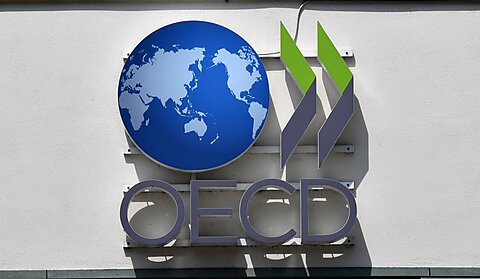Adam N. Michel
The Organization for Economic Co‐operation and Development (OECD) is seeking to raise taxes on multinational businesses by billions of dollars with a novel, internationally coordinated 15 percent minimum tax. Nearly 140 countries have signed on to this new global tax, including the Biden administration, and about 50 countries have taken steps to implement parts of the plan.
The OECD estimates the new minimum tax will raise $220 billion in annual, global corporate tax revenue. This would be a transfer from the private sector to governments. According to preliminary estimates, the transfer would result in at least $248 billion in costs. Thus, the new minimum tax would come at a net cost, or deadweight loss, to the global economy of at least $28 billion a year.
For the United States, the OECD plan is a clear loser. Recent estimates from the Joint Committee on Taxation (JCT) show that the new OECD rules could reduce domestic tax revenues by between $122 billion over ten years (if other countries implement the OECD tax and the U.S. does not) and $57 billion (if Congress concedes to the OECD and implements its international tax rules).
In addition to reducing federal revenue, the new global tax is estimated by others to reduce U.S. jobs by about 370,000 and cut annual investment by roughly $22 billion.
However, some argue that the JCT estimates are too pessimistic and that even if the rules do not accrue new revenue for the United States, the new OECD tax system is necessary to promote fairness and ensure other countries can raise additional revenue.
Taxes are a transfer from the private sector to the government. Those transfers come with additional costs to the economy. Even globally, the OECD’s optimistic projection of raising $220 billion must be weighed against the economic and administrative costs the government and private sector must incur. Recent estimates from Germany—one of the countries that could benefit the most from the new rules—report the revenue their government is expected to raise and the expected costs incurred by the government’s collection agency and the private sector.
In the first five years, the tax is expected to raise about €1.68 billion annually, compared to startup compliance costs (government and private) of €1.42 billion. The ongoing annual compliance costs are about 7 percent of the yearly revenue collected.
The new revenue for the government comes with other societal costs that should also be accounted for. The following estimates are highly imperfect, but they can provide a conservative, lower‐bound back‐of‐the‐envelope tabulation of the costs and benefits to global well‐being of the OECD’s tax increase. This analysis applies a similar framework used by Chris Edwards to assess the value of additional domestic IRS enforcement funding.
The German government estimates an ongoing annual cost of $76 million for the public administration of the new tax. Assuming the recurring costs are similar in other countries, it implies that the 139 countries signed on to the OECD deal will collectively spend about $11 billion annually administering the new tax.[1]
The annual ongoing private sector cost estimates from Germany imply compliance costs about 2.4 percent of the revenue raised. This suggests the private sector will conservatively spend about $5 billion complying with the minimum tax rules each year.
It is also widely acknowledged, including by the OECD, that higher taxes under the global minimum tax will reduce investment and shrink global GDP. The United Nations Conference on Trade and Development estimates that the OECD minimum tax will reduce foreign direct investment (FDI) flows by between 2 percent and 3 percent. A 2.5 percent reduction in the pre‐covid FDI average of approximately $1.8 trillion means that the new tax will reduce annual FDI by about $44 billion. This estimate is likely conservative, given the expected declines in domestic investment. Ernst and Young estimates a $22 billion reduction in U.S. domestic investment.
Adding up the costs, the OECD minimum tax will impose $60 billion in ongoing costs to raise $220 billion in new revenue. But the $220 billion is not new money. It is transferred from the private sector to the government. The only gain from this transaction is any additional efficiencies from world governments directing the resources instead of the private sector.
Government spending would need to be about 25 percent more productive than private sector spending to break even. While estimates vary widely, the highest return on government spending is usually infrastructure spending, for which the economic literature rarely estimates returns greater than 10 percent. If we make the generous assumption that the government spending is 10 percent more productive than its private sector alternative, the $220 billion in government spending (net of the $11 billion in government compliance expenditures) would generate $21 billion in additional benefits.
These rough estimates imply that the OECD global minimum tax proposal to raise $220 billion will impose an ongoing annual net cost of roughly $28 billion on the world.
While the JCT analysis makes it clear that the OECD minimum tax is a loser for the United States solely as a matter of the federal government’s finances, a fuller accounting of the proposal’s costs shows that it is also a net negative for the entire world.
[1] Converted at a 1.08 dollar to euro exchange rate. German cost estimates are projections, while the OECD estimate is in 2018 dollars. The OECD estimate is biased up as it is based on old and incomplete data. The rest of the calculations employ ratios or historical data from a similar timeframe. Private sector costs are used as presented.

